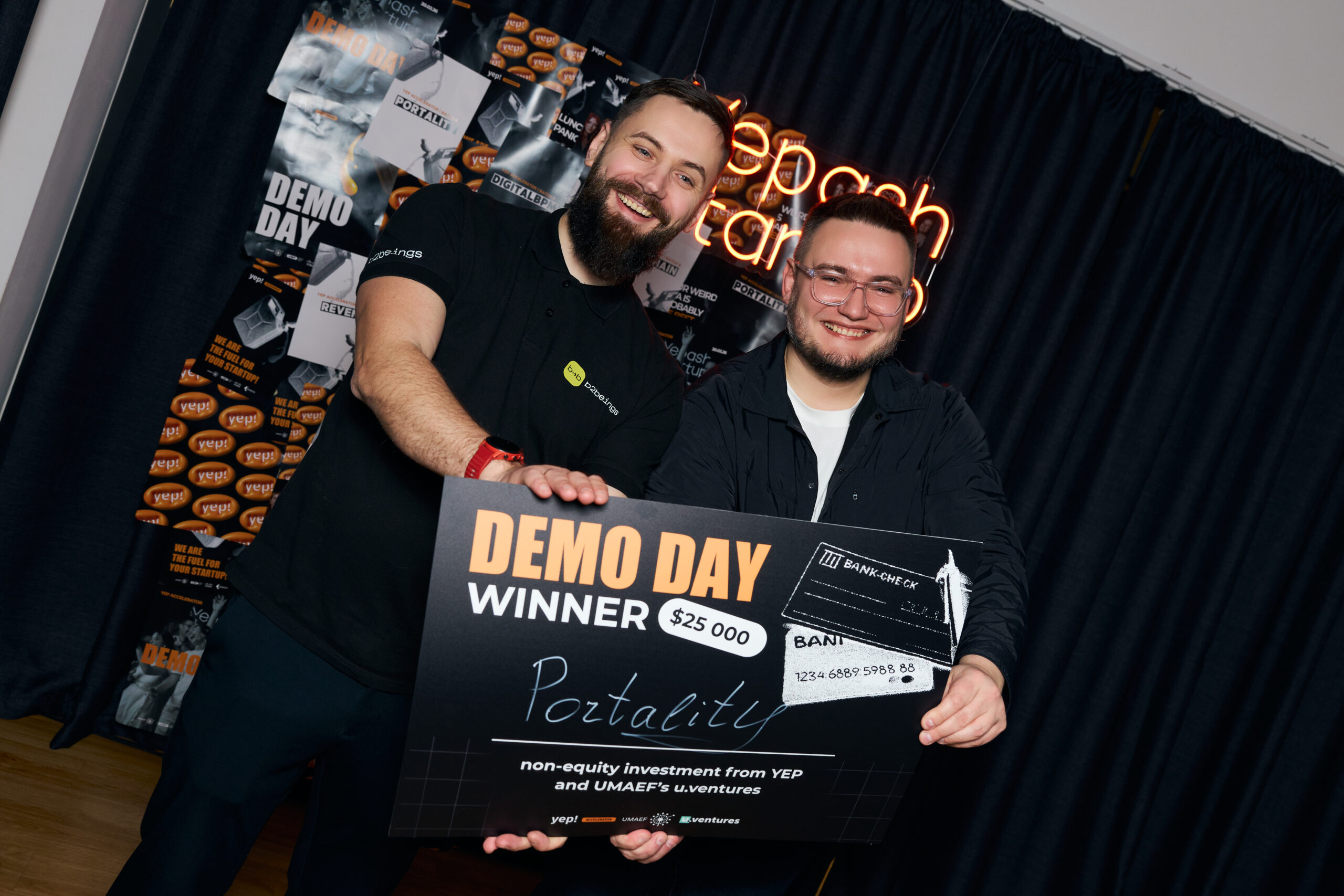Fintech-IT Group Becomes Ukraine’s First Fintech Unicorn After UMAEF Investment
Fintech-IT Group, the developer behind monobank, has become a unicorn, reaching a valuation of over $1 billion after attracting investments from the Ukraine-Moldova American Enterprise Fund (UMAEF) and a consortium of private investors.
This deal is significant for several reasons — notably because it marks the first time in a long while that a tech company with a valuation of $1 billion or more, operating in Ukraine with a clear local identity and registration (and not just Ukrainian founders abroad), has emerged. Scroll.media editorial team explains what makes this deal so interesting.
$1+ Billion for Fintech-IT Group
Fintech-IT Group has become the first Ukrainian tech company since the start of the full-scale invasion to receive an official $1+ billion valuation from a third-party investor and the first Ukrainian fintech to reach unicorn status.
However, it’s worth noting that the developers of monobank had already achieved unofficial unicorn-level valuation before the invasion. At that time, Letter One, owned by Mikhail Fridman and German Khan, reportedly offered $1 billion (according to some sources $1.1 billion) for monobank. The parties failed to reach an agreement before February 2022, and negotiations were not resumed afterward.
In essence, UMAEF’s investment has now confirmed that earlier valuation.
Following this deal, Oleg Gorokhovskyi and Mykhailo Rogalskiy — Fintech-IT Group’s co-founders — now have personal net worths of several hundred million dollars.
As a reminder, Fintech-IT Group includes Fintech Band, Kbyte1024, Shake-to-Pay, AC DC Procсessing, and several other companies.
How Much Was Invested?
That remains unclear. Market experts are reluctant to reveal details, citing many unknowns surrounding the transaction.
Let’s start with UMAEF, formerly known as WNISEF. Originally launched in 1994 by the US government, the fund has not been known for making large investments. Sources interviewed by Scroll.media estimate the amount to be around $5 million, and in exceptional cases, possibly up to $10 million.
Then there’s the «consortium of American private investors.» Who they are and how much they contributed remains undisclosed. It’s also unclear whether UMAEF acted as the lead investor or simply coordinated the group.
There are other interesting details here. In 2017, WNISEF founded u.ventures, which focuses on early-stage investments, making it unsuitable for a mature company like Fintech-IT Group. Meanwhile, in 2006, WNISEF helped launch Horizon Capital, participating in three funds totaling $65 million.
So why didn’t Horizon Capital invest in Fintech-IT Group? Market insiders suggest a few possible reasons:
- Horizon Capital’s focus has shifted toward export-oriented companies. Its latest fund prioritizes «export champions» and «fast-growing, export-driven businesses,» according to its mission statement. Most of Fintech-IT Group’s operations, however, remain Ukraine-based.
- Alternatively, the investment might simply not have met Horizon Capital’s internal criteria.
Still, two other market sources argue that the investment amount is not what matters most here.
«The company doesn’t need money to expand or scale. It’s likely the investment was aimed at strengthening its position in the e-commerce market. But the entire monobank ecosystem is so profitable that they could fund it five more times and still have cash left. And as you can imagine, it’s definitely not about the founders getting dividends. Overall, this investment is not really about the investment itself,» added one of the major investors who has worked in the market for many years but wished to remain anonymous due to the sensitivity of the topic.
For Fintech-IT Group, partnering with UMAEF, a fund backed by the US government, carries far more reputational value than financial.
«It’s like the case with Michael Pompeo and Kyivstar,» added another Scroll.media source, referring to a previous high-profile investment connection.
The Road to a Major Investor
The deal had been in preparation for quite some time, as evidenced by changes in the shareholder structures of several companies linked to co-founders Oleg Gorokhovskyi and Mykhailo Rogalskiy.
«UMAEF’s mission is to develop local markets and give regional companies the potential to grow. In the case of monobank, this deal is less about capital and more about opportunities. The next step could be attracting a major European or American investor,» said one source close to the negotiations.
Another potential direction for Fintech-IT Group could be re-entering Western markets, particularly after challenges in Poland. Having an American investor like UMAEF could open doors in that regard.
Why It Matters for Ukraine’s Tech Industry
This is a landmark reputational event not only for Fintech-IT Group, but for the entire Ukrainian tech ecosystem — on par with major deals like France’s NJJ acquiring stakes in Datagroup-Volia-lifecell, Kyivstar’s Nasdaq entry, or Grammarly’s $1 billion funding milestone.
For the global community, this sends a powerful message: even in a country at war, innovation and business growth continue to thrive.
Fintech-IT Group Becomes Ukraine’s First Fintech Unicorn After UMAEF Investment
Fintech-IT Group, the developer behind monobank, has become a unicorn, reaching a valuation of over $1 billion after attracting investments from the Ukraine-Moldova American Enterprise Fund (UMAEF) and a consortium of private investors.
This deal is significant for several reasons — notably because it marks the first time in a long while that a tech company with a valuation of $1 billion or more, operating in Ukraine with a clear local identity and registration (and not just Ukrainian founders abroad), has emerged. Scroll.media editorial team explains what makes this deal so interesting.
$1+ Billion for Fintech-IT Group
Fintech-IT Group has become the first Ukrainian tech company since the start of the full-scale invasion to receive an official $1+ billion valuation from a third-party investor and the first Ukrainian fintech to reach unicorn status.
However, it’s worth noting that the developers of monobank had already achieved unofficial unicorn-level valuation before the invasion. At that time, Letter One, owned by Mikhail Fridman and German Khan, reportedly offered $1 billion (according to some sources $1.1 billion) for monobank. The parties failed to reach an agreement before February 2022, and negotiations were not resumed afterward.
In essence, UMAEF’s investment has now confirmed that earlier valuation.
Following this deal, Oleg Gorokhovskyi and Mykhailo Rogalskiy — Fintech-IT Group’s co-founders — now have personal net worths of several hundred million dollars.
As a reminder, Fintech-IT Group includes Fintech Band, Kbyte1024, Shake-to-Pay, AC DC Procсessing, and several other companies.
How Much Was Invested?
That remains unclear. Market experts are reluctant to reveal details, citing many unknowns surrounding the transaction.
Let’s start with UMAEF, formerly known as WNISEF. Originally launched in 1994 by the US government, the fund has not been known for making large investments. Sources interviewed by Scroll.media estimate the amount to be around $5 million, and in exceptional cases, possibly up to $10 million.
Then there’s the «consortium of American private investors.» Who they are and how much they contributed remains undisclosed. It’s also unclear whether UMAEF acted as the lead investor or simply coordinated the group.
There are other interesting details here. In 2017, WNISEF founded u.ventures, which focuses on early-stage investments, making it unsuitable for a mature company like Fintech-IT Group. Meanwhile, in 2006, WNISEF helped launch Horizon Capital, participating in three funds totaling $65 million.
So why didn’t Horizon Capital invest in Fintech-IT Group? Market insiders suggest a few possible reasons:
- Horizon Capital’s focus has shifted toward export-oriented companies. Its latest fund prioritizes «export champions» and «fast-growing, export-driven businesses,» according to its mission statement. Most of Fintech-IT Group’s operations, however, remain Ukraine-based.
- Alternatively, the investment might simply not have met Horizon Capital’s internal criteria.
Still, two other market sources argue that the investment amount is not what matters most here.
«The company doesn’t need money to expand or scale. It’s likely the investment was aimed at strengthening its position in the e-commerce market. But the entire monobank ecosystem is so profitable that they could fund it five more times and still have cash left. And as you can imagine, it’s definitely not about the founders getting dividends. Overall, this investment is not really about the investment itself,» added one of the major investors who has worked in the market for many years but wished to remain anonymous due to the sensitivity of the topic.
For Fintech-IT Group, partnering with UMAEF, a fund backed by the US government, carries far more reputational value than financial.
«It’s like the case with Michael Pompeo and Kyivstar,» added another Scroll.media source, referring to a previous high-profile investment connection.
The Road to a Major Investor
The deal had been in preparation for quite some time, as evidenced by changes in the shareholder structures of several companies linked to co-founders Oleg Gorokhovskyi and Mykhailo Rogalskiy.
«UMAEF’s mission is to develop local markets and give regional companies the potential to grow. In the case of monobank, this deal is less about capital and more about opportunities. The next step could be attracting a major European or American investor,» said one source close to the negotiations.
Another potential direction for Fintech-IT Group could be re-entering Western markets, particularly after challenges in Poland. Having an American investor like UMAEF could open doors in that regard.
Why It Matters for Ukraine’s Tech Industry
This is a landmark reputational event not only for Fintech-IT Group, but for the entire Ukrainian tech ecosystem — on par with major deals like France’s NJJ acquiring stakes in Datagroup-Volia-lifecell, Kyivstar’s Nasdaq entry, or Grammarly’s $1 billion funding milestone.
For the global community, this sends a powerful message: even in a country at war, innovation and business growth continue to thrive.





